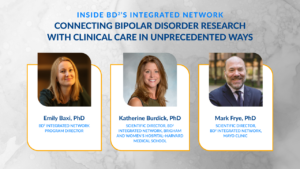Inside BD²’s Integrated Network: Connecting Bipolar Disorder Research with Clinical Care in Unprecedented Ways

BD²’s Integrated Network brings together research and care in a unique way that paves the way for personalized care for people living with bipolar disorder. The Integrated Network will connect thousands of participants and their care teams to a network of experts, allowing for real-time collaboration between study participants, scientists, and clinicians.
In the Inside BD²’s Integrated Network blog series, we will provide an in-depth look at the Integrated Network and how it works, including interviews with the Integrated Network program director, scientific directors, site leads, and working group experts.

The BD² Integrated Network is a groundbreaking approach designed to shorten the time it takes for research insights to be applied to improvements in care for people with bipolar disorder. By engaging a network of collaborating investigators and clinicians, BD² is building an unprecedented data ecosystem for bipolar disorder, implementing and informing data-driven improvements in care for people with bipolar disorder, and generating novel insights for interventional approaches.
The initiative weaves together a unique two-pronged approach – a traditional longitudinal cohort study, engaging people with bipolar disorder, with a learning health network aimed at improving outcomes.
In the Longitudinal Cohort Study, the Integrated Network sites will conduct deep phenotyping of a diverse group of people with bipolar I disorder to track the development of the disease and clarify its underlying biology. From these phenotypes, scientists and clinicians will aim to identify and understand important clinical, neural, and biological processes that drive improvements in care and treatment for bipolar disorder.
Paired with the Longitudinal Cohort Study is the Learning Health Network. At each site, clinicians implement on-the-ground, near-real-time improvements in clinical care based on the emerging insights from clinicians within the network and from the research data generated from the Longitudinal Cohort Study. By linking research with the improvement of clinical care, the Integrated Network will drive scientific discovery in bipolar disorder in a way that has never been done before in mental health or neuroscience.

To accelerate the increased scientific understanding of bipolar disorder, all BD² programs share data and findings. Our open science approach means findings in the Integrated Network can provide insight for research into biological mechanisms that drive disease (Discovery Research), genetic contributions (Genetics Platform), and determining molecular changes that can be detected in the brain (Brain Omics), effectively building the necessary foundations for bipolar disorder research and pushing the boundaries on what’s known to find new treatments and personalized care models.
To learn more about the BD² Integrated Network, we spoke to Program Director Emily Baxi, PhD, and Scientific Steering Committee members Katherine Burdick, PhD, and Mark Frye, MD.
What has BD² learned since the beginning of the Integrated Network that has led to any course changes or adaptations of the initiative?
“Over the past two years, BD² has built an incredible network of investigators and expertise. Together, we’re embarking on a journey that will be filled with learning. While the primary goals and objectives will remain unchanged – BD² aims for all people with bipolar disorder to thrive – our understanding of how to meet those goals is continually advancing. For example, with input from our partners and six founding sites, BD² has optimized the strategy for data collection across multiple modalities including imaging and electronic health records. This means the Integrated Network will be best positioned to generate novel insights and ultimately improve care.”
– Emily Baxi, PhD
“Even though we have been planning this initiative for nearly four years now, we have learned a lot since we launched back in September 2022. We have hit some expected bumps in the road as we navigated multi-center data sharing and regulatory approvals but we are now running on a more efficient model that will streamline these challenges. Each site currently participating in the Integrated Network brings to the table unique clinical approaches and research interests/expertise, which we are leveraging to build a well-rounded community with shared leadership. We look forward to the next phase of expansion and growth!”
– Katherine Burdick, PhD
“Since the launch, we have built a community that now partners with our leadership team to help shape the liftoff of the Learning Health Network. I would not say there has been any significant course changes; the design and energy is the same. Some adaptations along the way are to be expected to streamline work flows and get members of the team engaged.”
– Mark Frye, MD
What does the Integrated Network mean for people with bipolar disorder?
“I hope the Integrated Network serves to empower people with bipolar disorder. For those who choose to participate in the research study, it’s an opportunity to share their unique experience with bipolar disorder – their clinical course and biology – with a community designed to learn, derive insight, and rapidly translate findings back to the clinic. I think that’s a point of hope for everyone living with bipolar disorder.”
– Emily Baxi, PhD
“I have already heard from people with lived experience that the news of this unique initiative brings them new hope. This is a complex disease, which makes studying and treating it difficult. Many people with bipolar disorder are not thriving in their day to day lives, even when mood symptoms are controlled. My belief is that we are poised to change that and to do so in an accelerated way.”
– Katherine Burdick, PhD
“This is an unprecedented opportunity for lived experiential learning to partner with research and learning health. This will also help define outcome measures and study impacts that are meaningful to the lived experience.”
– Mark Frye, MD
BD² has an open Request for Applications for new sites to join the Integrated Network. Learn more and apply by Thursday, October 10, 2024.
Stay tuned for our next blog post on the Learning Health Network and its role in the Integrated Network.
